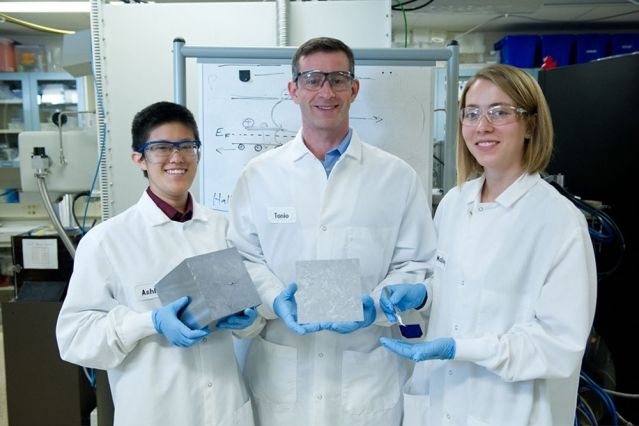Rocket and satellite litter is endangering private space commerce. Enter the cosmic debris tracking industry.


Blue Origin’s New Shepard Team is the winner of Aviation Week’s 60th Annual Space Laureate. New Shepard is only the first step in fulfilling Blue Origin owner Jeff Bezos’ vision of using ever larger reusable rockets to send an entire economy into Earth orbit and beyond. Following the Laureate Award presentations held at Washington’s National Building Museum on March 2, Bezos talked to Aviation Week and Space Technology Editor-in-Chief Joe Anselmo and the audience at the awards dinner about the importance of expanding into the solar system.
* we need to expand into the solar system. The choice is between stasis on earth or expansion and dynamism in space.
* Cost of space is too high so that thousands of companies can get into space and do interesting things, this will unleash creativity and experimentation that we see on the internet.
I use to hate it when my dad insisted that I read something longer than 2 paragraphs. (Something related to his interests, but not to my school work, his career or our family). That’s because it shouldn’t require a 30 minute read to determine if it piques my interest, as it does his.
But I am asking Lifeboat readers to invest 37 minutes in the video linked below. Even if you give it just 5 minutes, it will provide sufficient motive for you to stick around until the end. [continue below video]
I want you view it because we are on the threshold of something bigger than many people realize. Bitcoin and the blockchain is not just a new currency or a way of distributing books among network users. We are becoming involved with a radical experiment in applied game theory that is shockingly simple, but nascent. Opportunities abound, and the individuals who recognize those opportunities or learn to exploit them will benefit themselves as they benefit the global community. Because it is so radical (and because it clashes with deeply ingrained beliefs about authority, control mechanisms, democracy and money), it seems complex and risky—but it’s really not.
I am a Bitcoin educator and columnist. I have taught college seminars in Bitcoin and I will be keynote speaker at the 2017 Digital Currency Summit in Johannesburg. I design online courses for the most popular cryptocurrency self-learning groups. But Antonopolous runs circles around me. He is a Bitcoin evangelist extraordinaire. All of his presentations are superb, but this one provides context. It conveys an understanding that Bitcoin novices and professionals equally appreciate. It answers questions the viewer hadn’t asked, but would have.
There are hundreds of videos and PowerPoint presentations that explain how Bitcoin works. But they rarely provide context. Few of them convey why it is such an important development and why it has overtaken biotech & pharmaceuticals as the focus of VCs . Few can explain why an ethereal Bitcoin (a unit that you cannot hold) has just surpassed the value of a unit of gold. And few people realize that volatility has been abating as the increase in value and adoption is surging.
As you watch Antonopolous, you are certain to think about things that you did not previously know—or at least, that you did not reflect upon. My purpose in asking you to view it, is not to sell you on Bitcoin or the blockchain, but to provide the context that may help you to code, consult, write articles, teach, begin trading, start saving, and more.
Philip Raymond co-chairs Crypsa & Bitcoin Event, columnist & board member at Lifeboat, editor
at WildDuck and will deliver the keynote address at Digital Currency Summit in Johannesburg.
The Libertarian Republic covering my libertarian run for California Governor:
After realizing his chances to be President were over, Zoltan Istvan of the Transhumanist Party, has decided to take his platform and run for another elected office, and under a different political party.
Istvan didn’t have much of a chance at being president, but that didn’t stop him from campaigning as the Transhumanist Party’s candidate to promote his pro-technology and science positions. Now, he’s setting his sights a bit lower, and with a different party. Istvan announced this morning that he plans to run for governor of California in 2018 under the Libertarian Party, explains Engadet.com.
In a Newsweek article Istvan wrote, “We need leadership that is willing to use radical science, technology, and innovation—what California is famous for–to benefit us all. We need someone with the nerve to risk the tremendous possibilities to save the environment through bioengineering, to end cancer by seeking a vaccine or a gene-editing solution for it, to embrace startups that will take California from the world’s 7th largest economy to maybe even the largest economy–bigger than the rest of America altogether.”

While there are different flavors of the UBI, the basic concept is that everyone just gets money for existing—this, in theory, would help keep the economy running smoothly even as people are working less.
“Sounds like a communist scheme” jokes Pethokoukis. But he explains how this is actually a very old idea that has its roots on the political right as a way to simplify the welfare state. It’s an idea that’s really taken off among the libertarian-leaning luminaries of the tech world in recent years.
“Silicon Valley has sort of latched on to this idea. They have the most aggressive timetable as far as when we will actually see all these jobs hemorrhage,” explains Pethokoukis.

At Quora, I occasionally play, “Ask the expert”. Several hundred of my Quora answers are linked here. Today, I was asked “How much of Bitcoin’s value is driven by speculation”. This is my answer…
This is a great question! While the value of any commodity is determined by supply and demand, speculation is one component of demand. Another is the unique utility value inherent in a product or process. This is sometimes called ‘intrinsic value’.
It’s ironic that when a high fraction of value is driven by speculation, short-term value becomes volatile and long-term value becomes less certain—and less likely to produce returns for those same speculators.
Editor’s Note: In the past few weeks, a significant spike in Bitcoin’s value and trading volume relates to a pending regulatory decision expected at the end of next week. This activity is certainly driven by speculation. But for this article, I am considering periods in which the demands of individual events are less clear.
The value of Bitcoin is influenced by:
Here’s the rub: Bitcoin will not become a store of value unto itself (i.e. a currency), and it will not gain a significant fraction of the payment instrument market until the transaction volume of the first to user categories in the above list are overtaken by the the ones further down. Likewise, Bitcoin will not enter its biggest growth spurt until the last two items swamps the others as the largest motive for acceptance and use.
Put another way: Long term value must ultimately be driven by organic adoption from actual users (people who are buying and spending Bitcoin on other things.
 In another article, I expand on the sequence of events that must take place before Bitcoin grows into its potential. But make no mistake. These things will happen. In tribute to the brilliance of Satoshi, the dominoes are already falling.
In another article, I expand on the sequence of events that must take place before Bitcoin grows into its potential. But make no mistake. These things will happen. In tribute to the brilliance of Satoshi, the dominoes are already falling.
In response to the question, I estimate that at the beginning of 2017, 85% of Bitcoin value is still driven by speculators. I have not analyzed wallet holding periods compared against the addresses of known vendors. Furthermore, it would be difficult to understand the relationship between the number of speculative transactions and the overall effect on value. Therefore, my figure is more of a WAG than an calculated estimate. But it’s an educated WAG.
The fraction of speculative transactions will drop significantly in the coming months—even as late speculators jump on board. That’s because uptake from consumers and businesses is already taking off. The series of reactions that lead toward ubiquitous, utilitarian applications has begun. Bitcoin’s value will ultimately be driven by use as a payment instrument and in commerce.
Because it is a pure supply-demand instrument, Bitcoin will eventually be recognized as currency itself. That is, it needn’t be backed by precious metal, pegged convertibility or a redemption promise. When that happens, you will no longer ask about  Bitcoin’s value. That would be a circular question, since its value will be intrinsic. Instead, you will wonder about the value of the US dollar, the Euro and the Yen.
Bitcoin’s value. That would be a circular question, since its value will be intrinsic. Instead, you will wonder about the value of the US dollar, the Euro and the Yen.
As a growing fraction of groceries, gasoline and computers that you buy are quoted in BTC, you will begin to think of it as a rock, rather than a moving target. One day in the future, there will be a sudden spike or drop in the exchange rate with your national currency. At that time, you won’t ask “What happened to Bitcoin today? Why did it rise in value by 5% this morning?” Instead, you will wonder “What happened to the US dollar today? Why did it drop in value by 5%?”
Philip Raymond co-chairs Crypsa & Bitcoin Event, columnist & board member at Lifeboat, editor
at WildDuck and will deliver the keynote address at Digital Currency Summit in Johannesburg.

One thing is clear: the way in which we organize the economy and society will change fundamentally. We are experiencing the largest transformation since the end of the Second World War; after the automation of production and the creation of self-driving cars the automation of society is next. With this, society is at a crossroads, which promises great opportunities, but also considerable risks. If we take the wrong decisions it could threaten our greatest historical achievements.
We are in the middle of a technological upheaval that will transform the way society is organized. We must make the right decisions now.

Gets too advanced for me, but still interesting.
As the world transitions to a low-carbon energy future, near-term, large-scale deployment of solar power will be critical to mitigating climate change by midcentury. Climate scientists estimate that the world will need 10 terawatts (TW) or more of solar power by 2030—at least 50 times the level deployed today. At the MIT Photovoltaics Research Laboratory (PVLab), teams are working both to define what’s needed to get there and to help make it happen. “Our job is to figure out how to reach a minimum of 10 TW in an economically and environmentally sustainable way through technology innovation,” says Tonio Buonassisi, associate professor of mechanical engineering and lab director.
Their analyses outline a daunting challenge. First they calculated the growth rate of solar required to achieve 10 TW by 2030 and the minimum sustainable price that would elicit that growth without help from subsidies. Current technology is clearly not up to the task. “It would take between $1 trillion and $4 trillion of additional debt to just push current technology into the marketplace to do the job, and that’d be hard,” says Buonassisi. So what needs to change?
Using models that combine technological and economic variables, the researchers determined that three changes are required: reduce the cost of modules by 50 percent, increase the conversion efficiency of modules (the fraction of solar energy they convert into electricity) by 50 percent, and decrease the cost of building new factories by 70 percent. Getting all of that to happen quickly enough—within five years—will require near-term policies to incentivize deployment plus a major push on technological innovation to reduce costs so that government support can decrease over time.
From digital currency to machine learning, the financial industry is being rocked by exponential technologies. Blockchain, artificial intelligence, big data, robotics, quantum computing, crowdfunding, and computing systems are allowing startups to solve consumer needs in new ways.
The downfall of the world’s largest institutions may not be imminent, but these new technologies are breaking up the previously rock solid foundation of finance, and allowing the fintech world to spring through the cracks. What’s happening now will rewrite the future of finance for years to come. By recognizing this reality and planning for it now, financial professionals can learn to thrive in an increasingly uncertain global economy.

My apologies ahead of time everyone. LifeBoat is about awareness, discovery, history, social and economics and healthcare. And, I never ever post social situations on our site; however, I must raise this as it is all about humanity, being civilized, showing empathy, and respecting each other for, our passions in tech, science, medicine, etc., and simply for being humans with empathy.
Yesterday, I saw a disgusting report on how an innocent husband and wife who are US citizens and of Pakistan descent where verbally attacked by a horrible man on a flight to Houston, TX.
And, Wednesday a fellow techie lost his life in Kansas for being of Indian descent and his features. The person who shot and killed the young man didn’t even know if the engineer was born in the USA, or immigrated here or a citizen, etc. He just killed him as he verbally attacked him.